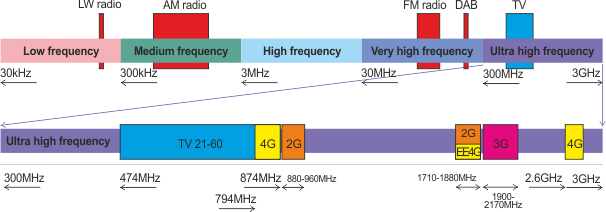Simon Beresford-Wylie is appointed as DMSL Chief executive
 Brian Butterworth published on UK Free TV
Brian Butterworth published on UK Free TV The chairman of DMSL, Andrew Pinder, said, "Ensuring Britain's terrestrial TV continues uninterrupted while Britain benefits from 4G at 800 MHz is a huge responsibility. The appointment of a highly experienced leader with a deep understanding of mobile telecoms and complex project delivery is an important step for the successful introduction of 4G on this new spectrum band in the UK".
 With the switch-over of TV services to digital, a band of frequencies previously used by TV is being made available for new, public, mobile communication services. This 800 MHz band is currently being auctioned by Ofcom to companies that wish to provide 4G services. 4G is a technology that delivers broadband connections to mobile devices.
With the switch-over of TV services to digital, a band of frequencies previously used by TV is being made available for new, public, mobile communication services. This 800 MHz band is currently being auctioned by Ofcom to companies that wish to provide 4G services. 4G is a technology that delivers broadband connections to mobile devices.
In certain circumstances, it is possible that new 4G services at 800 MHz could interfere with some existing terrestrial digital TV signals - see
How do I know if the 4G broadband will overload my Freeview?. DMSL's role is to ensure that people will receive their existing Freeview TV services when 4G is provided at 800MHz. 4G services operating in higher frequency bands, such as 1800MHz and 2.6GHz, do not have the potential to impact Freeview.

Beresford-Wylie said "I look forward to working closely with broadcasters and mobile network operators to ensure everyone continues to be able to receive their current TV service. DMSL plans to pre-empt the majority of potential interference issues caused by 4G at 800MHz and existing TV services. We're focused on being able to provide anyone who may be affected with the information and equipment they'll need to ensure they continue to receive free-to-air TV."
From 2009 to 2012 Mr Beresford-Wylie was CEO of smart meter company Elster Group, and prior to this, he led the formation of mobile broadband specialist Nokia Siemens Networks as its chief executive from 2007 to 2009, having been head of the networks division for Nokia since 2005.
The DMSL website is here - Let's be clear at 800MHz | 4G Interference | 4G Problem | MitCo AT800 .
| link to this comment |
"Because cable and satellite users will not be affected by 4G interference, assistance will only be provided to households relying on Freeview as their primary TV service. This means up to 900,000 households will be entitled to free help to solve the interference. Any households receiving cable or satellite will not be eligible for free help."
Great, so if you have freevie and sky, it's tough you have to pay. Another con.
| link to this comment |
Ian's: mapI's Freeview map terrainI's terrain plot wavesI's frequency data I's Freeview Detailed Coverage
4:44 AM
"Any households receiving cable or satellite will not be eligible for free help."
That does indeed stink. Especially if they include non-subscribers who have Freesat or out of contract boxes. They nay be denied many channels they only get from Freeview.
How could they know you have though? Most help will be sending out filters for us to fit.
Quite wrong they're allowed to limit filters to one per household. How many have just one Freeview TV or recorder nowadays? I have seven! They wreck the reception, they pay!
| link to this comment |
woodface/Ian: From what they have said, they will provide filters for anyone who is using Freeview on non-primary sets, but you won't be able to cancel you Sky package, and get DMSL to come along an re-provide it.
They have to draw the line somewhere or some people will just exploit it...
| link to this comment |
11:51 AM
Wrexham
I was wondering, are these filters simply just an in-line coax filter that is fitted between your aerial and TV/box/PVR?
If so, presuming all your TV's receives their signal from the same aerial, then by fitting the filter at the aerial end before the signal goes through your signal distribution system, then there should only be a need for one filter and not a filter for each of your (7) TV's?
| link to this comment |
Stuart's: mapS's Freeview map terrainS's terrain plot wavesS's frequency data S's Freeview Detailed Coverage
Also of interest is the fact that a 4G handset could cause interference, what were the powers that be thinking when this was all put forward???????????
| link to this comment |
Ian's: mapI's Freeview map terrainI's terrain plot wavesI's frequency data I's Freeview Detailed Coverage
5:34 PM
Even if a 4G signal in the channel 61-68 range, and the TV transmitter you pick up from uses channels 52-60, wouldn't the TV or Freeview box be able to distinguish 4G signals from Freeview signals? Surely 4G signals will be a totally different format to Freeview (DVB 8K) signals.
| link to this comment |
Nicholas Willmott: Please see How do I know if the 4G broadband will overload my Freeview? | 4G mobile | ukfree.tv - 10 years of independent, free digital TV advice - I explained it all there.
| link to this comment |